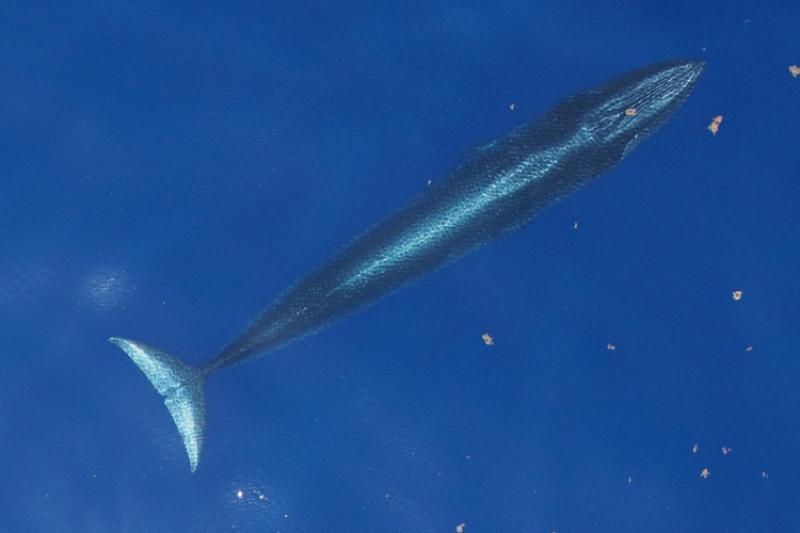
Celebrate Whale Week with NOAA Fisheries: A message from Janet Coit, Assistant Administrator
by NOAA Fisheries 30 Apr 2023 17:56 UTC

A Rice's whale just under the surface of the water in the Gulf of Mexico. This endangered whale was recognized as a separate species from the Bryde's whale in 2021 © NOAA Fisheries under NOAA Permit No. 21938
Whales are some of largest and the most magnificent animals on Earth, and some whale species are among the world's most endangered.
At NOAA Fisheries, our team of dedicated scientists and managers is responsible for the health and sustainability of more than 30 whale species in U.S and territorial waters.
Every year, we spend a week taking a deeper dive to share our whale expertise. This year is particularly notable because it is the 50th anniversary of the Endangered Species Act. Some of the most recognizable whales—North Atlantic right whales, Southern Resident killer whales, and Cook Inlet belugas—are at the top of our Species in the Spotlight initiative.
While climate change makes conserving these whales more challenging, we are proud of the conservation successes we've made.
Endangered Species Act at 50
The Endangered Species Act is a powerful and effective tool for conserving species and their habitats. Under the Act, NOAA protects more than 160 marine and anadromous species, and I will say, without hesitation, that the ESA has been overwhelmingly successful in preventing their extinction during the last 50 years. The Act has also put many species on the path to recovery to the point where they no longer need protections under the ESA.
Under the ESA, NOAA Fisheries works with other federal agencies and our partners to conserve nine whale species and nine distinct population segments of whales, as well as the ecosystems upon which they depend. One of our greatest success stories is the recovery and eventual delisting of the eastern stock of gray whales—once listed as endangered under the Endangered Species Act. Fourteen distinct population segments of humpback whales were also delisted in 2016. These victories for endangered and threatened species speak to the success of the Act and the conservation work it supports.
Stay tuned for more information about NOAA Fisheries' 50th anniversary celebration of the Endangered Species Act.
Climate Change Challenges
Fifty years ago, climate change was not well known; now, it is considered one of the greatest threats to the natural world. The impacts of climate change are intensifying locally and globally, significantly affecting marine life and ecosystems. These environmental changes include warming oceans, rising seas, ocean acidification, and an increase in the frequency and intensity of extreme weather events.
Whales are particularly vulnerable to the effects of climate change because these effects can be magnified toward the top of the food web. Endangered and threatened whales like North Atlantic right whales and North Pacific right whales and Southern resident killer whales are similarly impacted by climate change, making their recovery even more challenging.
NOAA Fisheries is committed to our mission to conserve protected species in the face of these threats. With our partners, we have taken a series of steps to advance climate-focused science and management including:
- Climate vulnerability assessments for marine mammals and sea turtles
- Scenario planning to address uncertainties, predict impacts, and prioritize mitigation and recovery actions
- Climate-smart conservation training to educate staff about implementing climate adaptation tools in their work
These activities improve our understanding of and ability to address the impacts of climate change on protected species and their habitats while increasing climate readiness.
Ongoing unusual mortality events
While we've made significant strides in whale conservation, research, and recovery under the Endangered Species Act, several whale species face new and continuing challenges to their recovery. There are three active Unusual Mortality Events for whale species:
- Atlantic humpback UME declared in 2017 and currently 191 individuals in the UME
- North Atlantic right whale UME declared in 2017 and currently 98 individuals in the UME
- West coast gray whale UME declared in 2019 and currently 640 individuals in the UME
Understanding and investigating marine mammal UMEs are crucial because they can be indicators of ocean health, giving insight into larger environmental issues which may also have implications for human health.
I invite you to take time over the next week to reflect on the importance of whales in our marine ecosystems. This week and every week, NOAA Fisheries protects and conserves all whale species—from the Cook Inlet beluga whales in Alaska, to Rice's whales in the Gulf of Mexico, to blue whales, which are found in every ocean. We engage our partners—including the Marine Mammal Commission—as we develop regulations and management plans that foster healthy fisheries and reduce the risk of entanglements, create whale-safe shipping practices, and reduce ocean noise. Please join me in celebrating Whale Week as we highlight whales, their conservation, and the 50th anniversary of the Endangered Species Act.
Janet Coit
Assistant Administrator, NOAA Fisheries